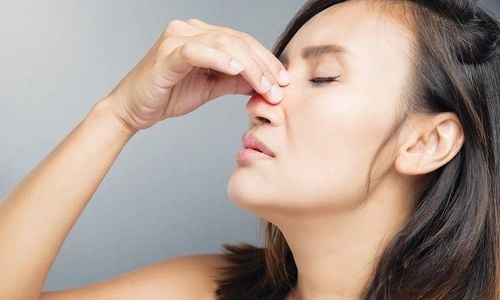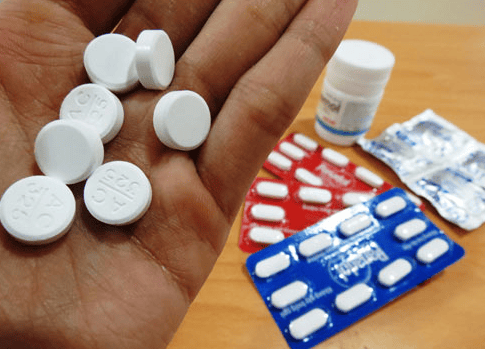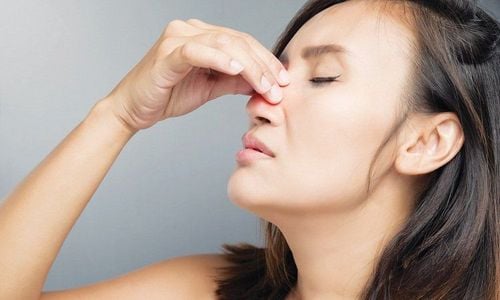This is an automatically translated article.
Allergic rhinitis is a common disease that causes many unpleasant symptoms for sufferers. At the time of changing seasons, seasonal allergic rhinitis - a typical form of allergic rhinitis occurs more and more, making patients tired. This condition causes symptoms such as stuffy nose, sneezing, and even headaches. Check out some tips to treat seasonal allergies at home below.
1. What is seasonal allergic rhinitis?
Seasonal allergic rhinitis is also known as seasonal allergic rhinitis. It is an allergic rhinitis that persists from year to year and the onset of the disease will depend on the season in which the allergen is present. For example, the flowering season of a certain plant, the season in which the caterpillars breed, the wet season with many molds, or the cold dry season...
Seasonal allergic rhinitis has typical symptoms such as: sneezing, stuffy nose and clear runny nose. These symptoms will usually last 1-2 weeks. May be accompanied by dyspnea, bronchial asthma, lacrimation or conjunctivitis. The common subjects of seasonal allergic rhinitis are children under 10 years old and adults.
1.1. Causes of seasonal allergic rhinitis The main causes of seasonal allergic rhinitis are pollen from a tree that often blooms in a certain season of the year:
Spring: Longan, cycad, pomelo tree... Summer: Flower of phoenix tree, dandelion tree... Autumn: Flower of milk flower, ylang-ylang... Winter: Flower of chrysanthemum flower, cabbage... Besides, mites Dust, mold or contact with chemicals, hair or animal droppings are also triggers. Patients with asthma and asthma also often have seasonal allergic rhinitis.
1.2. Symptoms of seasonal allergic rhinitis will be different for each person, including:
Nose: Runny nose, stuffy nose, sneezing, decreased sense of smell, itchy nose , postnasal drip, facial pain. Eyes: Red, itchy, swollen, lumpy feeling in the eyes and dark circles under the eyes. Throat or Ears: Sore throat, congestion or ringing in the ears, hoarseness, itchy throat or ears. Sleep: Mouth breathing, daytime fatigue, frequent awakenings, difficulty performing normal activities such as studying or working because of uncomfortable nasal congestion.
2. Effective home remedies for seasonal allergic rhinitis
2.1. Use of therapeutic drugs Use antihistamines to inhibit the production of this active substance when the nasal mucosa is exposed to allergens. It can be used in the form of a spray or an oral medication. Use nasal decongestants to reduce the impact of the disease on daily activities. However, it should only be used according to the prescribed dose, not overdoing the drug. Using corticosteroid-containing nasal sprays is also a way to relieve symptoms if the patient has an acute allergy or has severe symptoms. If the allergy is too severe, the person may require anti-allergy injections to control the symptoms.
2.2. Tips to relieve symptoms of seasonal allergic rhinitis simple at home Wash your nose with physiological saline: Use physiological saline to wash the mucus inside the nasal cavity, which can be better antibacterial without causing irritation for mucosa. Steam with natural essential oils: Essential oils such as menthol, tea tree, eucalyptus ... have the effect of clearing the nasal cavity when steaming. Drink ginger water in the changing seasons: Boil fresh ginger water mixed with honey and lemon to drink every day, can add cloves and cinnamon. Ginger has the ability to relieve nasal congestion and runny nose. Because ginger has a warming effect, patients with seasonal allergic rhinitis should drink honey ginger water every morning during cold weather. Vitamin C Supplement: Vitamin C is a nutritional compound that has many effects, including antihistamine properties - the cause of allergic rhinitis symptoms. Foods rich in vitamin C can be mentioned as oranges, tangerines, kiwis, strawberries, guava, tomatoes, bell peppers, potatoes, bean sprouts...
3. Prevention of seasonal allergic rhinitis
To prevent seasonal allergic rhinitis, it is necessary to stay away from allergens and strengthen the body's immunity:Clean the house every day, wash sheets, blankets, pillows, cushions and mats every day. week. Avoid keeping furry pets like cats and dogs in the house. When you suspect that there is a plant around that may cause an allergic reaction, it should be removed immediately. Limit exposure to chemicals such as laundry detergent or insect spray... Regularly open the door in the house to catch the sun to eliminate mold. Keep your body warm and eat warm foods, especially in the cold season. Hope the information in the above article has helped you understand the tips to treat seasonal allergies at home. If you have any questions, please contact Vinmec doctor for examination and support.
Please dial HOTLINE for more information or register for an appointment HERE. Download MyVinmec app to make appointments faster and to manage your bookings easily.













